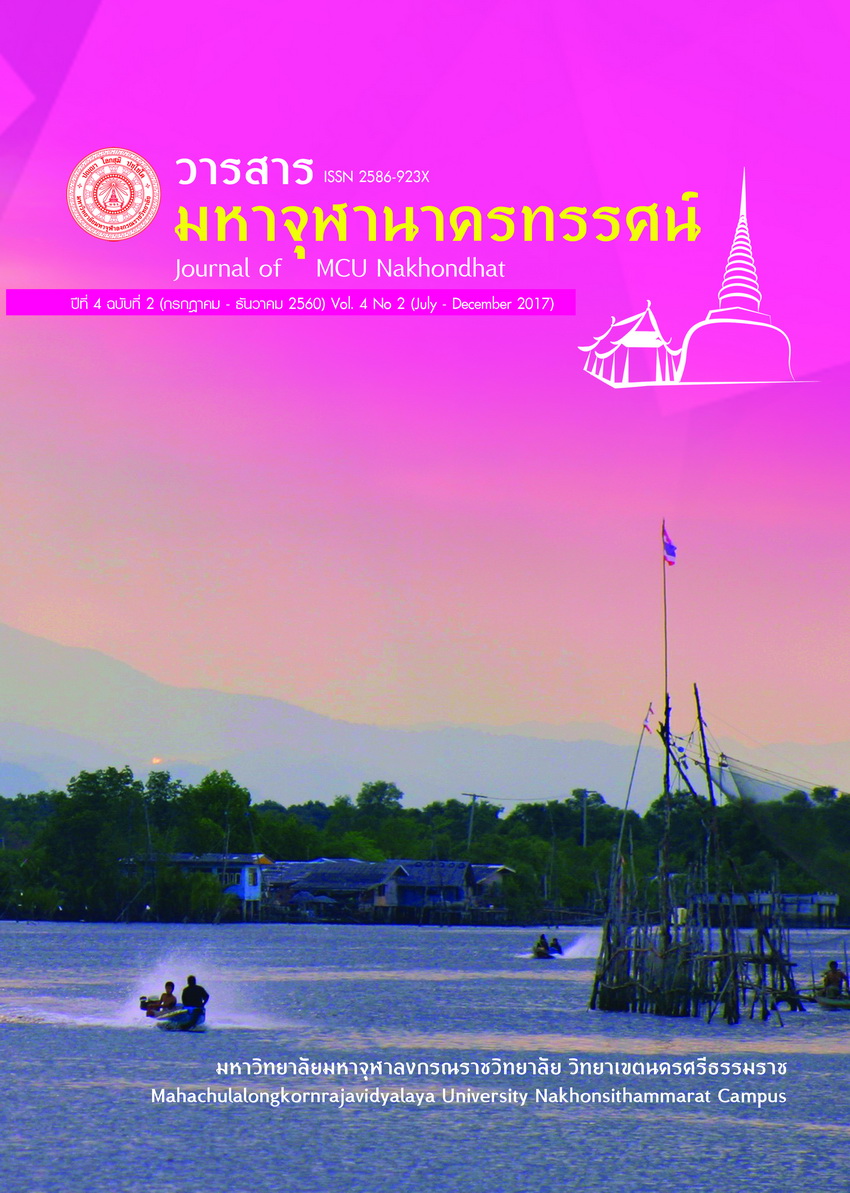STUDY BELIEF IN ORDINATION IN THERAVADA BUDDHISM : A CASE STUDY OF PHATTHALUNG PROVINCE.
Main Article Content
Abstract
The objective of this research were as follows 1. To study the concepts on Theravada Buddhism ordination 2. To study the belief in ordination in thai society 3. To study belief on Theravada Buddhism ordination in Phatthalung province by qualitative research designed from searching data, document and interview were about 16 persons.
The findings were as follows:
- The concepts in Theravada Buddhism ordination found that 1. The ordination means to leave out from house, without dwelling free life with any influence from any others, freedom from state of existence. 2. The ordination made lots of interests to many people 3. The ordination made out life to go with purposiveness 4. The ordination means to be on Dhamma-Vinaya for modeling of purification attainment 5. The ordination means to be served the Buddha’s works.
- The belief of ordination in Thai present time found that the ordination aimed to settle down, cultivate all virtues, responsibility of the male youth in themselves and others, the ordination made a good people, return the good man to society, to be benefit to community and rural, the monk brought community to growth because of the relation between monk and common people are in good relations, the ordination made the opportunity to study Buddhist Dhamma principle for telling to others to understand practice in along with state and condition.
- The belief in Buddhism of Phatthalong province found that they believed on sacred things, ancient spiritual and auspicious time and applying Dhamma principle for practice as related with agricultural society.
Article Details
How to Cite
วุฒิสาครธรรม พ., & จินดา พ. ป. (2017). STUDY BELIEF IN ORDINATION IN THERAVADA BUDDHISM : A CASE STUDY OF PHATTHALUNG PROVINCE. Journal of MCU Nakhondhat, 4(2), 31–48. retrieved from https://so03.tci-thaijo.org/index.php/JMND/article/view/152979
Section
Research Articles
References
แก้ว ชิดตะขบ. (2555). ประวัติความสำคัญของพระพุทธศาสนา. กรุงเทพมหานคร: สำนักพิมพ์พระพุทธศาสนาแห่งชาติ.
พระพรหมคุณาภรณ์ (ป.อ.ปยุตฺโต) . (2554). พจนานุกรมพุทธศาสน์ ฉบับประมวลศัพท์ พิมพ์ครั้งที่ 35. กรุงเทพมหานคร: โรงพิมพ์ บริษัท สหธรรมิก จำกัด.
พระมหาประศักดิ์ อคฺคปฺปญฺโญ (ชั่งแสง). (2541). ความเชื่อเรื่องโหราศาสตร์กับกฏแห่งกรรมของชาวพุทธไทยในปัจจุบัน. กรุงเทพมหานคร: โรงพิมพ์มหาจุฬาลงกรณราชวิทยาลัย.
มหาวิทยาลัยมหาจุฬาลงกรณราชวิทยาลัย. (2539). พระไตรปิฎกภาษาไทย ฉบับมหาวิทยาลัยมหาจุฬาลงกรณราชวิทยาลัย. กรุงเทพมหานคร: โรงพิมพ์มหาจุฬาลงกรณราชวิทยาลัย.
เสถียร พันธรังสี. (2534). ศาสนาเปรียบเทีย พิมพ์ครั้งที่ 7. กรุงเทพมหานคร: โรงพิมพ์มหาจุฬาลงกรณราชวิทยาลัย.
เสถียร โพธินันทะ. (ม.ป.ป.). ประวัติพระพุทธศาสนา พิมพ์ครั้งที่ 3. กรุงเทพมหานคร: สำนักพิมพ์บรรณาคาร.
พระพรหมคุณาภรณ์ (ป.อ.ปยุตฺโต) . (2554). พจนานุกรมพุทธศาสน์ ฉบับประมวลศัพท์ พิมพ์ครั้งที่ 35. กรุงเทพมหานคร: โรงพิมพ์ บริษัท สหธรรมิก จำกัด.
พระมหาประศักดิ์ อคฺคปฺปญฺโญ (ชั่งแสง). (2541). ความเชื่อเรื่องโหราศาสตร์กับกฏแห่งกรรมของชาวพุทธไทยในปัจจุบัน. กรุงเทพมหานคร: โรงพิมพ์มหาจุฬาลงกรณราชวิทยาลัย.
มหาวิทยาลัยมหาจุฬาลงกรณราชวิทยาลัย. (2539). พระไตรปิฎกภาษาไทย ฉบับมหาวิทยาลัยมหาจุฬาลงกรณราชวิทยาลัย. กรุงเทพมหานคร: โรงพิมพ์มหาจุฬาลงกรณราชวิทยาลัย.
เสถียร พันธรังสี. (2534). ศาสนาเปรียบเทีย พิมพ์ครั้งที่ 7. กรุงเทพมหานคร: โรงพิมพ์มหาจุฬาลงกรณราชวิทยาลัย.
เสถียร โพธินันทะ. (ม.ป.ป.). ประวัติพระพุทธศาสนา พิมพ์ครั้งที่ 3. กรุงเทพมหานคร: สำนักพิมพ์บรรณาคาร.


